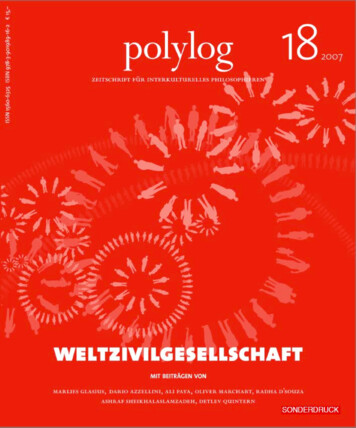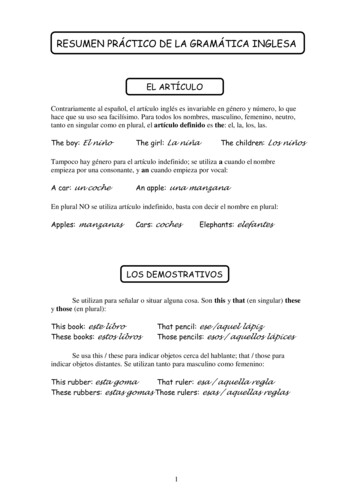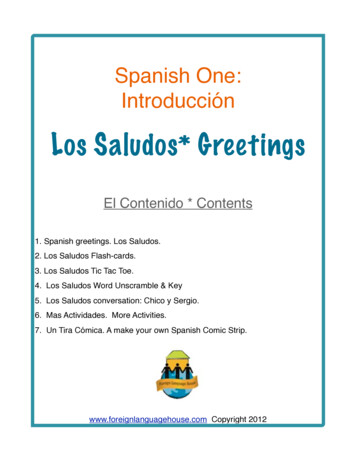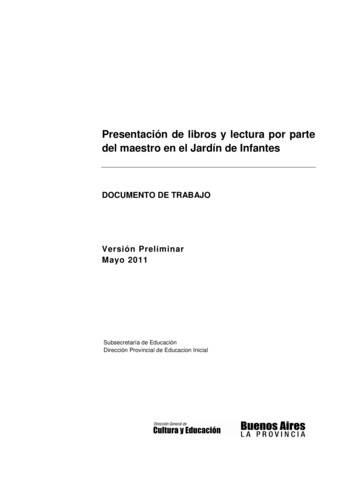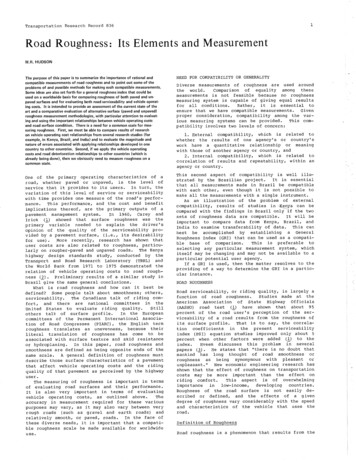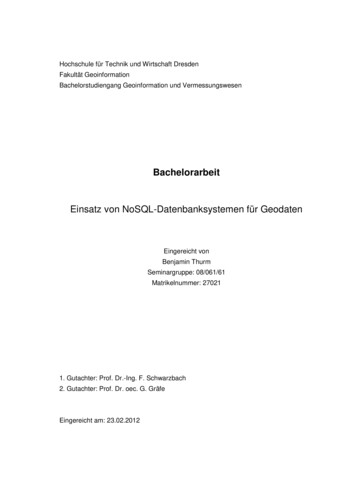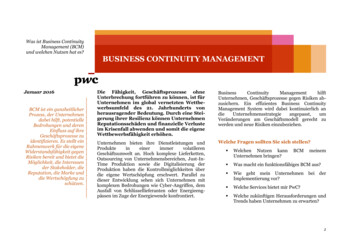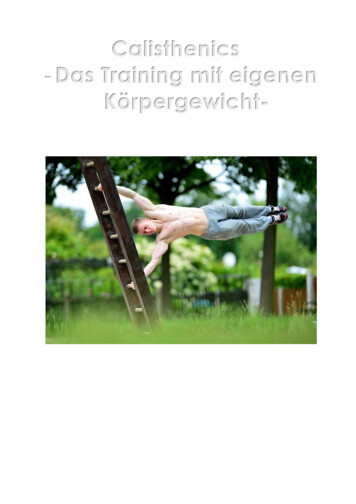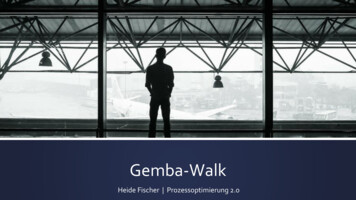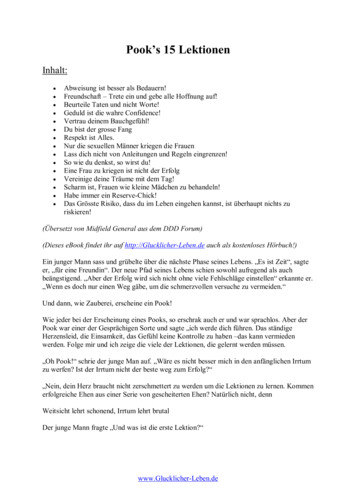
Transcription
Birgit GasperschitzSusanne HechtGiuseppina PiccardoWas ist los in Hauptstraße 117?www.hauptstrasse117.deGerman for BeginnersWorkbook accompanying the videoLevel A.1 A.2.1(version 28/09/2007)Jena 2007
Was ist los in Hauptstraße 117? – www.hauptstrasse117.de2
Was ist los in Hauptstraße 117? – www.hauptstrasse117.deDie Deutsche Bibliothek – CIP-EinheitsaufnahmeGasperschitz, Birgit/ Hecht, Susanne/ Piccardo, Giuseppina:Was ist los in Hauptstraße 117? German for beginners. Workbook accompanying the videoJena: ThULB, 2005English version by Matthew Harper, Michael Patterson and Richard Slippin collaboration with Susanne HechtFinal editing: Susanne HechtSOCRATES-Project no.: 42161-CP-1-97-1-DE-INGUA-LDTelenovela für den Deutschunterricht - A soap-opera for learning GermanDescriptionVideo or DVD, 148 minutes long; 11 episodes (may be ordered fromorder@hauptstrasse117.de)Workbook onlineGlossary onlineTranscription of dialogues with translation onlineDialogues with gaps onlineInteractive exercises online (work in progress)Background informations onlineWebsitewww.hauptstrasse117.deTarget - LevelA2.2 of the Common European Framework of ReferenceContentLevel A1 and A2.1 of the Common European Framework of ReferenceWith reference to the Roman Model of Profile Deutsch:Carlo Serra Borneto et altri (2003): Ein “europäisches” Curriculum für denStudiengang “Lingua tedesca” – Das “Römische Modell”, Università di Roma I„La Sapienza“Coordinator:Susanne HechtPartners:Transkom - Institut für transkulturelle Kommunikation - Susanne Hecht, deUniversità degli Studi di Genova, it (Prof. Dr. Giuseppina Piccardo)De Montfort University Leicester, uk (Prof. Dr. Michael Patterson)Chancen e.V. Velbert, de (Josua Vogelbusch, technical coordination)Tricast Video Production Wuppertal, desupported byGoethe-Institut, deRegionalverband Ruhr, deWebsite supported by:Friedrich-Schiller-Universität Jena, üringer Universitäts- und LandesbibliothekInstitut für Germanistische Sprachwissenschaft/ Lehrstuhl für Sprechwissenschaft/Prof. Dr. Adrian Simpson3
Was ist los in Hauptstraße 117? – www.hauptstrasse117.deOnline-Exercises - Report SheetSign your work already done to get an 12345678910114
Was ist los in Hauptstraße 117? – www.hauptstrasse117.deContentsPREFACE - HOW TO WORK WITH THE MATERIAL . 8START . 10face to faceGerman geographythe alphabet; numbers 1-100present tense of the regular verbs and of sein (to be)EPISODE 1 . 21origin, nationality, family status, address, date and place of birthgiving opinions of other people and situations; description of psychological conditionsdirect questionsEPISODE 2 . 28where people liveexpress regret and react to apologiesarticles (definite, indefinite, negative, possessive)the negation "nicht" (not) and "kein/e" (not one, not any, none)request, invitation, encouragement: the imperativemodal words: doch, malTEST A . 34EPISODE 3 . 38living, eating, working, socializingquestions without question wordswishes and requests: ich möchte. (I’d like)comparison of equality (so . wie)present tense of the verbs haben and wissenmodal words: denn, eigentlich, ja, aber, wirklichEPISODE 4 . 46asking for and giving tourist information about citiesasking and describing a waytalking about people and their flatscompound nounscomments and suppositionsTEST B . 57EPISODE 5 . 61essential things of lifehow to express preference and exaggerationhow to write a private letterhow to write a formal letter5
Was ist los in Hauptstraße 117? – www.hauptstrasse117.deEPISODE 6 . 68eating and food - and how to get itthe plural of nounsthe accusativepresent tense of the verbs essen, nehmen and wollenhow to give reasons with nämlichEPISODE 7 . 76income and healthcomparisonpresent tense and usage of the modal verb könnendeclination of nouns: nominative, accusative, dative (1)TEST C . 88EPISODE 8 . 92cookinghow to express an indirectpiece of advice, a necessitypresent tense of sollen and müssennicht brauchen zuhow to use the personal pronouns (1)EPISODE 9 . 104how to ask for prices, how to bargain, how to sell and how to talk about hobbieshow to ask for permission, to allow or forbid somethingthe past perfect of regular verbsthe simple past of sein and haben,the present tense of dürfenconstruction of the sentence (inversion)adverbs of timeTEST D . 118EPISODE 10 . 122problems in the family and family relationshipshow to give information about locations and directions (prepositions)the past participle of irregular verbs (1)declination: pronouns and articles (2)the separable verbwerden - future and suppositionthe modal word wohlTEST E . 1406
Was ist los in Hauptstraße 117? – www.hauptstrasse117.deEPISODE 11 . 144daily routines and a lot of emotionsindication of timethe past participle of irregular verbs (2)wenn, weil, dass: how to give reasons and to use when-clauses and indirect speechmore about prepositionsconstruction of the sentence with aber, oder, und, denn, dochpronominal adverbs: darüber, darunter etc.coherent texts with adverbs and pronounsTEST F. 163PHOTO CREDITS .1657
Was ist los in Hauptstraße 117? – www.hauptstrasse117.dePreface - How to work with the materialSo you would like to learn German? Right away? Or you would like to freshen up your knowledge? And havefun? Then this course is the right one for you. Better still: It will offer you insights into daily life in the FederalRepublic of Germany at the turn of the millennium. It will describe the Germany of today, whose citizens arelearning to cope with the upheavals in global politics after the collapse of socialism in Eastern Europe.Soap OperaWe have made a soap opera for you. A very special soap. Our film is special, because the people in thestory are genuine people. There are no actors, just people who play themselves. And the stories they act outare based on actual events.Of course, we have been free in our treatment of these genuine characters and true stories and have addedsome fictional elements - partly to protect the privacy of the performers, partly, given the limitations of timeand language, to focus on the essentials. Sometimes reality and fiction coincide, sometimes not.Fiction and Real lifeThe inhabitants of ‘Hauptstrasse 117’ introduce themselves as private individuals.We supply background information on them in English on our website. That way you will acquire a great dealof information about the typical way of life of contemporary Germans.Most of the performers live or used to live in the little town of Langenberg (Velbert) in the Ruhr district.PresentationEach episode of our soap opera is introduced by a commentary. The commentary sections were filmed in akindergarten which the child performers attend. They are assisted by the three children from the soap opera,Jenny, Manuel and Kai-Lino. There was a gap of several years between the filming of the original soapopera and the commentary. You can see how much older the children are – and how they have changed.Children and adultsChildren don’t always speak very clearly, so we were further assisted by the actor and German scholarMichael Patterson from England and the singer Eileen Küpper, who comes from South Africa.Michael is an expert on so-called Poor Theatre. We told him what passages were going to be presented, andMichael, helped by Eileen and the children, simply improvised with the props and furniture that were to handin the kindergarten. Eileen’s participation was very important, since we have never come across anyone whospeaks German better than her. In the online exercises we were asisted by two professors of Germanphonetics and speech: Gottfried Meinhold and Adrian Simpson.Components of the material DVD (you can order it under www.hauptstrasse117.de / order) dialogues and cloze dialogues (with gaps) (download) workbook (download) glossary (download) interactive exercises (online) cultural background (online)8
Was ist los in Hauptstraße 117? – www.hauptstrasse117.deHow can you learn best with this material?You should watch the episodes in consecutive order. Only when you can easily understand every word andhave completed all the exercises you should watch the next episode. We suggest you proceed in thefollowing way, but feel free to find your own one!1. Try to anticipate what the people might want to say when you watch the episode for the first time.2. Compare your predictions with the translation provided with the dialogues and see whether you wereright.3. Concentrate on pronunciation during the third viewing. Follow the dialogue in German, comparingthe sound to the way the word is written.4. Now watch the episode again without the aid of the transcript, to check if you can understandeverything. If not, watch it again with the transcript.5. Watch the episode once more using the dialogue with gaps (download or online). Fill in the gapswhile listening. If you want to print out only one copy of the text, use a pencil, so you can eraseeverything or write the missing words on another sheet of paper.6. Print out the gap-text a second time. Try to fill in the gaps from memory, without listening to thedialogue. If this proves too difficult, watch the episode again, but try it with the sound turned off.7. Now do the exercises in the workbook as well as the online exercises. The online exercises arethe most important exercises for you! You can't do without them. In the workbook you can findreferences to helpful online exercises indicating the number of the episode (“St” “Start”), the kindof exercise (P “Pronunciation”) and the number of the exercise:onlineSt P5Use the report sheet in this book to get an overview of your work already done.8. Finally you can cover the transcript of the dialogue and try to reconstruct the dialogue with the aid ofthe translation. But do not overdo it!Watch out!Some episodes contain a lot of material. The first episode is particularly full. Don’t overdo it! Progress at yourown pace. Simply work on not more than 5 minutes of film following the recommended procedure, andcontinue slowly. Expect to spend about 250 hours on the course!Reward yourself at the end of every unit, and especially after every test, as you have taken a big steptowards learning German. If you are doing the course alone, there is nobody there to praise you, so youhave to do this yourself!And don’t forget: it works better with a touch of self-irony. That’s what we used, when we were writing thisbook.And as for grammar: if you get nervous at the sight of the word, remember that you simply don’t need a lot ofit if you only want to make yourself understood. Just try the online-exercises. And do them as many times aspossible. But if you want to express yourself properly, then definitely look at the grammar. And if you’re reallyinterested, read the footnotes too!Have fun, and we wish you all the best with your venture into the German language!9
Was ist los in Hauptstraße 117? – www.hauptstrasse117.deStartThe video contains 10 episodes of a family soap opera, each of which is introduced by a didacticpresentation and a practice session of the language structures required to understand the plot. The 10episodes are preceded by the Start segment, which provides a language introduction without a plot. There ismuch to do in this segment - watch it in small portions. Repeat it several times and then use the book.Whenever necessary, watch the individual sequences again to complete the exercises.At the end of this segment- you will be able to establish contact with other people in German. You will be able to greet them, saygoodbye to them, and say your name, age and where you live. You will be able to ask their name, andintroduce a third person to them- you will get to know the German alphabet, the numbers 1 – 100, the forms of the very important verb “sein”and other verbs in the present tense1 Begrüßung / Ways of saying helloWhen you meet someone you can say the following:- Guten Morgen!1- GutenTag!2- Good morning!- Good day! Good afternoon!- Guten Abend!- Good evening!- Hallo!- Hello! Hi! (between friends, to children or when answering the phone)- Na, du?- Well? (between young people, to children)After saying hello, you can add:- Wie geht's?How are you?The other person can reply:- Danke, gut.Fine, thanks.- Es geht so.Not so bad.- Danke, es geht so.Not so bad, thanks.When leaving someone you can say the following:- Auf Wiedersehen!- Goodbye!- Tschüss!- Bye-bye! (between friends and to children)When leaving someone at night you can say:- Gute Nacht!Good night!1Achtung / Attention: In German all nouns start with a capital.Achtung: In the south of Germany (in Süddeutschland) and in Austria (in Österreich) you will often hear“Grüß Gott!”, also “Servus” in Austria, and in Switzerland (in der Schweiz) “Grüezi!”210
Was ist los in Hauptstraße 117? – www.hauptstrasse117.de1.1 Say hello to the following people:Guten Tag, Frau.! – Guten Tag, Herr . ! - Hallo! – Guten Morgen, wie geht's?Hallo , Manuel!(Ulli Ogiewa)(Elsbeth Hinz)(Uschi Rydzewski)(Robert Tomašek)(Harald Neumann)1.2 Match the numbers to the appropriate letters. How would you ?1. greet someone that you know wella. Danke, gut.2. wish someone a good nightb. Auf Wiedersehen!3. say goodbye to a strangerc. Wie geht's?4. ask how someone isd. Guten Tag! / Guten Morgen!5. greet a strangere. Tschüss!6. say goodbye to someone you know wellf. Gute Nacht!7. give a positive answer to “How are you?”g. Hallo!1.3 Guess how they greet each other (paying attention to the regional usages)1. München (Munich), at the Viktualien market: a middle-aged man, slightly cheeky / a very curvy lady sellingvegetables2. Berlin: a 70-year-old widow / a well-built new male tenant3. Düsseldorf, Königsallee, at the red traffic lights: he's on a moped / she's on a BMW 1000 motorbike4. Wien (Vienna): Franz Joseph and Karl, two old friends (born in 1918) at a café5. Dresden, the Semper Opera House, at the première of the Aida: the female head of the Deutsche Bank/ a secretary in the same dress6. Köln (Cologne): a great-grandmother / her grandchild on the phone, at 8am on New Year's Day11
Was ist los in Hauptstraße 117? – www.hauptstrasse117.de2 Ich heiße . Und du? / I am . And you?Germans distinguish between you and you!It means that they don’t say you to everybody.If they call people by their last name, they use a polite form: SiePay attention to this phenomenon. Where can you see it?onlineSt D3Ways of introducing yourself:- Ich bin Ulli / CordulaI’m Ulli / Cordula- Ich heiße Ulli / CordulaI’m called Ulli / Cordula- Mein Name ist Ulli / CordulaMy name is Ulli / CordulaIf you want to know a person’s name, you can choose from the following, depending on how well you knowthem:- Wie heißt du?- What’s your name? (to a child, between young- Wie ist dein Name?people)- Wie heißen Sie?- What’s your name? (to an adult stranger)- Wie ist Ihr Name?If you want to introduce someone else, you can say: “Das ist . "(This is .) If you are asked "Wer ist das?"(Who is that? answer "Das ist . " (That is )2.1. Use these answers to reply to the list of questions, using a different voice for each answer:Ich heiße Harald Neumann. – Ich bin Tina Heidermann. – Ich heiße Kai-Lino.Mein Name ist Elsbeth Hinz. – Robert Tomašek. – Manuel.- Wie heißt du?- Wie heißen Sie?- Wie ist Ihr Name?12onlineSt D2
Was ist los in Hauptstraße 117? – www.hauptstrasse117.de2.2 Answer the following questions: “Das ist ”Wer ist das?3 Das Alphabet/ The alphabetAÄBCChDEFG/A://K://"//43//s// chGustavJKLMNOÖPQ/j// H//,//-//.///://¡://0H// chTUÜVWXY/s/, /://s//4H//5//9//&/, /6//6// n to the pronunciation samples online. If you can’t do that, the following table can help you a little bit.onlineSt P6Reference: Oxford English Pronunciation13
Was ist los in Hauptstraße 117? – www.hauptstrasse117.deonlineStP1-5j pronounced like yä pronounced like a long a (as in blame)ö a sound between e and u (like the ur in burden)ü a closed u sound (like the u in duty – but without they sound that precedes it, same as French u, as in rue)a before double consonants short (between a and u asin the Northern English fat) or, before a single consonantlong as in father, but never as in tame). Note: ß countsas a single consonant, so Hauptstraße is pronounced“Howptshtrahsser”q pronounced like cvr pronounced eitherwith a glottal trill (like theFrench r, as in rue) or,in Southern Germany,with a rolled tongue (likethe Spanish torro)s before vowels pronounced like the s invase, in the other cases like ss in guessau pronounced like ou in poundee pronounced like a long a (as in blame, Beethoven)ei pronounced like i in lifeß, ss pronounced like the ss in passsch pronounced like the sh in shakesp, st at the start of a word or a syllable (or ateu / äu pronounced like oi in spoilthe start of part of a word within a compound,i pronounced before double consonants short as ine.g. “Buchstabieren”) are pronounced asmiddle or before single consonant long (like the ie inthough they were written shp, shtbrief), but not as in lifeth pronounced like tie pronounced like ie in siegeu pronounced before double consonantsach, och, uch ch pronounced here as a hard gutturalshort (like the oo in good), or before a singleexhalation (like the composer’s name Bach)consonant long (like the oo in food, but moreech, ich ch pronounced here as a softer palatalrounded), but not as in tubeexhalation (as in a whispered y in yes)v pronounced like the f in fish, in words ofg nearly always hard (as in gift, never – except forLatin origin like the v in tvsome foreign words - as in ginger)w pronounced like the v in vineig g here pronounced like the soft chz pronounced like ts in PatsyonlineSt C43. 1 PronunciationPay attention to your pronunciation. If you can’t use the online exercises, you can use the remote control tostop the video or the DVD, so that you can repeat the phrases you hear. Listen out for the following, andrepeat them until you can copy the sounds exactly:Guten Tag, Frau Hinz!Oh, Guten Morgen!Guten Tag, Uschi!Na, wie geht’s?Ach, es geht so.Das ist Herr Neumann.Das ist Brigitte.Wie heißt du denn?Ich heiße Viktor.Wie ist Ihr Name?Buchstabieren Sie bitte.14onlineSt C2
Was ist los in Hauptstraße 117? – www.hauptstrasse117.de4 Zahlen / Numbers (1 - ote: The numbers from 13 to 19 are formed without any conjunction (e.g. dreizehn), the numbers abovetwenty include und (dreiundzwanzig)onlineSt D44.1 Fill in the missing letters:z eiiersi bendrezw nzigeunein ndzwanzigzwölacht ehnfündreißie fechscht5 Wie die Zeit vergeht . / As time goes by .To ask a person’s age, you can say “Wie alt bist du?” (to a friend or a child) or “Wie alt sind Sie?” (to astranger or slight acquaintance).The answer:I am 20 (years old)onlineSt D1Ich bin zwanzig (Jahre alt).If you ask a woman how old she is, follow her reply with “Das ist nicht wahr!” (That can’t be true!)Your first compliment in German – it’s bound to please!5.1 Match the answers with the questions1. Hallo. Wie geht's?a. Ich bin 30 (Jahre alt)2. Wie ist Ihr Name?b. Danke, es geht.3. Wer ist das?c. Ich bin 6.4. Wie alt sind Sie?d. Manuel.5. Wie heißt du?e. Das ist Robert.6. Wie heißen Sie?f. Elsbeth Hinz.7. Wie alt bist du?g. Mein Name ist Tina Heidermann.onlineSt G415
Was ist los in Hauptstraße 117? – www.hauptstrasse117.de6 The present tense of “sein”onlineSt G1In this first section you will become familiar with some forms of the verb “sein” (to be).Here is a table of the present tense. Warning: the verb “sein” is irregular!seinichduSiebinbistsinder / sie /esistwirihrSiesindseidsindsiesindto beIyou (familiar singular)you (formal, singular orplural)he/ she/ itamareareweyou (familiar plural)you (formal, singular orplural)theyareareareisareYou always use the form of the third person plural if you have a formal relationship with a person. Thisform always begins with a capital letter.As an English native speaker perhaps you feel like a German child. For some years you can calleverybody du, but at a certain age you have to change and call adults like your teachers Sie. This isreally embarassing at the beginning.You will learn the forms step by step. For the moment you really need to know:Ich bin Lino.Wer bist du?Wer sind Sie?Wer ist das?6.1 Complete with the correct forms of “sein”1. Das Kai-Lino.3. Du Manuel.2. Ich Tina.4. Wer Sie?I am Kai-Lino.Ich bin Kai-Lino.7 Noch ein paar Informationen / Some more informationRevise the sequence where Tina and Ulli meet. Try to remember what they say about themselves.To describe where you live, you need the verb wohnen ( in). you see the typical German verb ending: -en.This ending changes according to the different persons.For someone talking about themselves (ich), most German verbs end in -e, for example:Ich wohne in München. (I live in Munich.)If like Tina and Ulli you have no children, you would say “Ich habe keine Kinder” (I have no children).Otherwise you would say: “Ich habe ein (1) Kind, zwei (2) Kinder, drei (3) Kinder” etc.In spoken language the final –e of the verb is often missing. You often can hear:Ich hab’ keine Kinder. Ich wohn’ in Düsseldorf.16
Was ist los in Hauptstraße 117? – www.hauptstrasse117.de7.1 Who is that? Write and speak the phrases as in the exampleDas ist Martin Bauer.(This is Martin Bauer)Das ist Monika Schuster.Er ist achtzehn (Jahre alt).(He is 18 years old.)Sie istEr wohnt in Köln.(He lives in Cologne.)Sie wohnt1. Martin Bauer18 JahreKöln3. Katrin Müller22 JahreBerlin2. Monika Schuster34 JahreDüsseldorf4. Peter Reinberg48 JahreBern5. Kristina Klinger65 JahreDortmundonlineSt R13.4.5.7.1 I am . Write and speak the phrases as in the exampleNow try repeating the above information as though you were the person speaking:Ich bin Martin Bauer. (I am Martin Bauer)Ich bin 18 (Jahre alt). (I am 18 years old.)Ich wohne in Köln. (I am living in Cologne)17
Was ist los in Hauptstraße 117? – www.hauptstrasse117.de8 Geographie? / Don’t know much about geography Which German cities are mentioned in the video? Please tick the ones you lease listen to the extract again and pay special attention to the pronunciation. How does Eileen pronouncethe ü in Düsseldorf and the ö in Köln (Cologne)? You would like to know where certain towns are situated?onlineSt P2If so, please ask in the following way: "Wo liegt Dortmund (Bonn etc.)?" (Where is ?")If the answer "in Deutschland" is not enough, please consult the map and see whether the city is in thenorth (im Norden), in the south (im Süden), in the west (im Westen) or in the east (im Osten). You canalso check in which region, in which "Bundesland" (federal state) it is.im Nordenim Westenim Ostenim Südenonline1 D38.1 Where do these cities actually lie?Berlin – Kiel – Schwerin – Saarbrücken – Dresden – Düsseldorf – Hamburg – Stuttgart – MünchenBerlin liegt im Osten. Und Kiel?Kiel18
Was ist los in Hauptstraße 117? – www.hauptstrasse117.de9 The verbs in the present tenseonlineSt G3Let’s look at a normal verb like wohnen. You see the typical German ending –en. This ending changesaccording to the different persons. We call this conjugation. You will see that sometimes you don’t have tochange anything.The verbs wohnen (to live/to be at home) and heißen (to be called), which occur in the first episode, areconjugated like this (we put the polite form of ‘you’ at the end of the table):Personwohn-ento liveheiß-ento be calledich (I)wohneliveheißeam calleddu (you)wohnstliveheißtare calleder/sie/es (he/she/it)wohntlivesheißtis calledwir (we)wohnenliveheißenare calledihr (youwohntliveheißtare calledsie (they)wohnenliveheißenare calledSie (you)wohnenliveheißenare calledAchtung/ Note: Most verbs in German are conjugated in this way.9.1 Try to conjugate!Personbuchstabierenseinheißengehen (to go)onlineSt G2(I) i(you)d(he/she/it)e /s /e(we)w(you)i(they)s(you)(polite form)SAchtung/ Note: Practise the conjugation every time you learn a newverb!19
Was ist los in Hauptstraße 117? – www.hauptstrasse117.deStart – Lösungen1.2 1.g; 2.f; 3.b; 4.c; 5.d; 6.e; 7.g1.3 1. Grüß Gott 2. Guten Tag 3. Hallo! – Na, du! 4. Servus! 5. Guten Abend. 6. Hallo – Guten Morgen!2.1 Wie heißt du? – Manuel. / Ich heiße Kai-Lino.Wie heißen Sie? / Wie ist Ihr Name? – Ich heiße Harald Neumann. / Ich bin Tina Heidermann. / Mein Nameist Elsbeth Hinz. / Robert Tomašek.2.2 Das ist Brigitte. / Das ist Cordula. / Das ist Tina. / Das ist Elsbeth. / Das ist Lucie. / Das ist Susanne.4.1 zwei, vier, sieben, drei, zwanzig, neun, einundzwanzig, zwölf, achtzehn, fünf, dreißig, elf, sechs, acht5.1 1.b; 2.f/g; 3.e; 4.a; 5.d; 6.f/g; 7.c6.1 1. ist; 2. bin; 3. bist; 4. sind7.1 Das ist Monika Schuster. Sie ist 34 Jahre alt. Sie wohnt in Düsseldorf. / Das ist Katrin Müller. Sie ist 22Jahre alt. Sie wohnt in Berlin. / Das ist Peter Rheinberg. Er ist 48 Jahre alt. Er wohnt in Bern. / Das istKristina Klinger. Sie ist 65 Jahre alt. Sie wohnt in Dortmund.7.2 Ich bin Monika Schuster. Ich bin 34 Jahre alt. Ich wohne in Düsseldorf.9.1 ich buchstabiere, du buchstabierst, er (sie, es) buchstabiert, wir buchstabieren, ihr buchstabiert, siebuchstabieren, Sie buchstabieren / ich bin ., du bist ., sie ist ., wir sind ., ihr seid ., sie sind ., Sie sind/ ich heiße ., du heißt ., er heißt ., wir heißen ., ihr heißt ., sie heißen., Sie heißen / ich gehe, dugehst, es geht, wir gehen, ihr geht, sie gehen, Sie gehen.20
Was ist los in Hauptstraße 117? - www.hauptstrasse117.de Die Deutsche Bibliothek - CIP-Einheitsaufnahme Gasperschitz, Birgit/ Hecht, Susanne/ Piccardo, Giuseppina:
